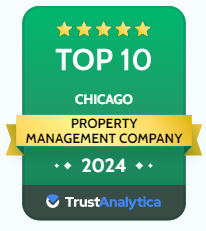Do Not Make These Mistakes as a New Landlord
When you are new to rental property ownership it is easy to make mistakes due to a lack of experience. We’d like to share some of the avoidable errors based on many years of experience.
Not having a legal, clear, professionally written lease.
You can find a lot of generic leases online, however, you need to make certain that the one you decide to use is legal in your state. As an example, we’re in Chicago and the city has special ordinances that are not applicable to other parts of Illinois or any other state. To use a generic, off the web lease would be in violation of many of the City
ordinances. You could find yourself in court for using such a lease. So, it is vitally important to have a legal lease that complies with state law. Consider hiring an attorney from the property location to write or provide a legal lease for you.
Assuming the property will be rented every day, every month.
Tenants do not always live forever in one place. They move as their circumstances change. When a tenant moves out it can take 1-2 months to get the property back in shape and for the new tenant to move in. Don’t think you can have one tenant move out and a new tenant move in the next day. While it could happen, it is rare and the stars have to be perfectly aligned for that to happen. Generally, the property at the minimum needs a good cleaning. Tenants don’t always get the carpets cleaned and the cabinets wiped out when they move out. The landlord is stuck with getting this done.
To have a new tenant ready to move in requires the old tenant to be cooperative in showing the property. If the property is not showing-ready the property will be difficult to rent. That is why it is preferable to have the unit vacant for a showing. You are not having to work around a tenant’s schedule.
Failing to run a background and credit check.
Having the right tenant is more important than just getting the property rented fast. More landlords have regretted not getting the all-important background and credit check than regretted waiting an extra week or so for the right tenant to come along. While the background and credit check are not always fooled proof, it does provide important information about the paying habits and ability of the tenant. Nothing is worse than putting a new tenant in place then have the tenant stop paying rent in month two. Take the time to put the best tenant in place.
Delaying an eviction.
Evictions are expensive and time-consuming and inexperienced landlords are reluctant to file. The primary cause for eviction is because a tenant has failed to keep up with his rent payments. The longer you delay the eviction, the more behind the rent will be. You
need to act quickly and within the legal guidelines for an eviction. Have an eviction attorney on speed dial in advance so you are ready to move quickly. Not acting quickly to fix repairs. Both routine maintenance and emergency repairs are to be expected and should be
planned for. Industry standards suggest saving between one and three percent of your property’s value for maintenance. Expect repairs and act swiftly to protect the property and tenant. Waiting too long for some repairs can cause additional, more expensive damage. The repair will need to be made eventually, do it quickly to protect your investment and respect the tenant’s need for a safe environment.
Thinking that property management is an easy job to do yourself.
Managing a rental property is more than just collecting rent, unclogging a toilet, and mowing the lawn. It requires expertise and knowledge for compliance with federal, state, and local laws. You must be compliant with fair housing and real estate laws. You must be aware of any local ordinances and be prepared to register the property with local authorities and pass required inspections. You need to understand criminal background check laws, collection protocols, and lease enforcement. And you need to know the legal requirements for filing an eviction.
During the Covid-19 situation, you needed to be constantly up to date on the changing laws relating to the tenants affected by job loss and illness.
Most landlords soon realize that all the hours spent on managing a property and tenant is better spent on family or work obligations and leave the management to professionals.








